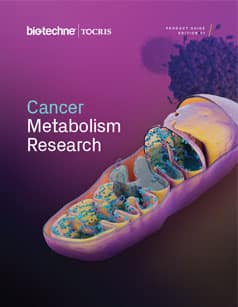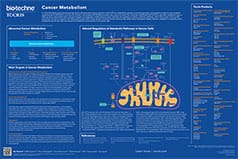Hexokinases
Hexokinases catalyze the first essential step of glucose metabolism, the conversion of the substrate glucose into glucose-6-phosphate. This phosphorylation event directly couples extramitochondrial glycolysis to intramitochondrial oxidative phosphorylation.
Hexokinases Inhibitors |
|
|---|---|
| Cat. No. | Product Name / Activity |
| 7512 | 3-Bromopyruvate |
| Hexokinase II inhibitor; also inhibits MCT1 | |
| 1646 | Lonidamine |
| Mitochondrial hexokinase inhibitor | |
Hexokinases Activators |
|
| Cat. No. | Product Name / Activity |
| 5133 | GKA 50 |
| Glucokinase activator | |
Other |
|
| Cat. No. | Product Name / Activity |
| 4515 | 2-Deoxy-D-glucose |
| Non-metabolizable glucose analog; inhibits glucose metabolism | |
Hexokinases catalyze the first essential step of glucose metabolism, the conversion of glucose into glucose-6-phosphate. This directly couples extramitochondrial glycolysis to intramitochondrial oxidative phosphorylation. There are two subtypes of mitochondrial hexokinases, HK1 and HK2, each of which has four isozymes designated hexokinase I, II, III and IV.
HK1 and HK2 are both localized to the outer mitochondrial membrane, with HK1 being found in nervous tissue and HK2 in insulin-responsive tissues such as skeletal muscle. Activation of mitochondrial hexokinases is regulated by Akt/PKB-mediated phosphorylation and they are subject to inhibiton by their end product, glucose-6-phosphate. In addition to glucose metabolism, mitochondrial hexokinases have been implicated in antiapoptotic and cell survival signaling.
External sources of pharmacological information for Hexokinases :
Literature for Hexokinases
Tocris offers the following scientific literature for Hexokinases to showcase our products. We invite you to request* your copy today!
*Please note that Tocris will only send literature to established scientific business / institute addresses.
Cancer Metabolism Research Product Guide
This product guide reviews some of the main areas in cancer metabolism research and lists around 150 products that can be used to investigate metabolic pathways in cancer including:
- Glycolysis
- Tricarboxylic Acid Cycle
- Lipidogenesis
- 1C Metabolism and Nucleic Acid Synthesis
- Drivers of Metabolic Reprogramming
- pH and Redox Balance
Cancer Metabolism Poster
This poster summarizes the main metabolic pathways in cancer cells and highlights potential targets for cancer therapeutics. Genetic changes and epigenetic modifications in cancer cells alter the regulation of cellular metabolic pathways providing potential cancer therapeutic targets.

